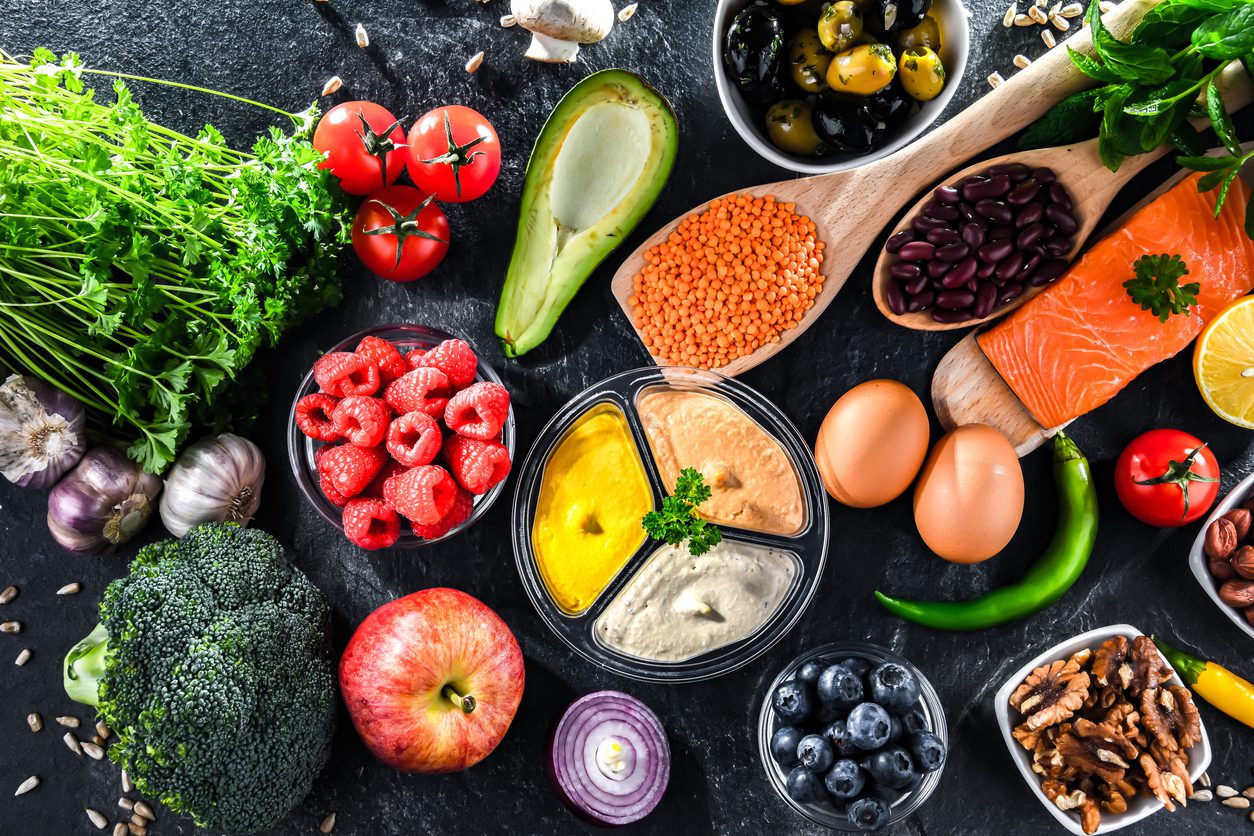
Published on May 16, 2025
Last modified on Dec 22, 2025
Anti-Inflammatory Diet Tips for Menopause…According to a Dietitian
5 min read
Inflammation seems to be one of those wellness words that’s tossed around all the time, especially in the women’s health space. And while most of us generally understand it’s not great for our overall health, the actual significance of inflammation on our well-being might feel opaque. We sat down with Registered Dietitian Nutritionist Anita Mirchandani to learn more about the connection between inflammation and the menopause transition – and how diet can play a role.
First, what exactly is inflammation?
Inflammation is part of our body’s normal response to infection or injury. It essentially causes damaged tissues to release chemicals that signal to white blood cells that it’s time to start repairing — which is what we want to happen when there’s an injury. What we DON’T want, however, is for the inflammation to become chronic and spread throughout the body, as chronic inflammation can increase our risk of heart disease, stroke, obesity, diabetes, and other chronic disease.
How does menopause impact inflammation?
Estrogen and progesterone have anti-inflammatory effects. As we begin to experience hormonal changes during perimenopause and menopause — particularly decreased estrogen levels — we lose some of that protection.
Technically speaking, these changes result in alterations in the metabolism of lipids (types of cholesterol). This triggers the body’s natural inflammatory response, and can result in decreased muscle mass and weight gain, especially around the abdomen — hello “meno belly” — which can in turn lead to higher levels of inflammation. As it becomes chronic, inflammation is associated with a range of cancers, and increased risk of osteoporosis.
If you’re thinking that none of that sounds particularly inspiring, I totally hear you — but there is plenty within our control when it comes to preventing and treating inflammation, and a lot of it comes down to how we fuel our bodies.
5 Anti-Inflammatory Diet Tips I Swear By As a Dietitian
#1. Manage sugar intake.
Sugary drinks, refined carbs, processed foods, and shelf-stable snacks all contain added sugar that can cause inflammation when consumed in excess. What you may be surprised to learn is that sugar substitutes may also create inflammation. This doesn’t mean you can never enjoy a piece of cake or slice of pizza, though. I suggest the 80-20 rule: 80% of your food is wholesome, inflammatory-friendly foods, and 20% is allotted for treats.
#2. Incorporate color.
The bright colors found in fruits and vegetables represent different phytonutrients such as antioxidants and other compounds that combat inflammation. Focusing on the balanced plate method at every meal is a great way to increase your intake of vitamins, minerals, anti-inflammatory compounds, and fiber. Filling your plate with a variety of vegetables also helps manage caloric intake coming from starches, which I recommend consuming in moderation as they don’t provide quality nutritious calories.
#3. Follow the Mediterranean diet.
The Mediterranean diet is a great guide to eating healthfully thanks to its prioritization of low-carbohydrate and anti-inflammatory foods. This eating style incorporates whole grains (think brown rice and quinoa), legumes, lean protein, and fiber rich-veggies, all of which help to achieve vitamin and mineral diversity. The Omega-3 fatty acids (found in oily fish like salmon and mackerel) and extra virgin olive oil are well-known for helping reduce inflammation in the body.
In addition to combatting inflammation, this way of eating may help with symptoms of menopause. For instance, flaxseed and legumes such as chickpeas and lentils all contain phytoestrogens — plant-based compounds that mimic the role of estrogen in the body and may help minimize hot flashes/night sweats. And we can’t overlook leafy greens, which are rich in vitamins such as lutein, which helps to support the nervous system and slow cognitive decline.
READ MORE: 8 Foods That Help With Menopausal Brain Fog (plus key differences between brain fog and Alzheimer’s)
#4. Consume alcohol in moderation.
Alcohol hinders fat metabolism which is necessary for keeping inflammatory levels lower, making it a not-so-inflammation-friendly indulgence. For some, it can also exacerbate menopausal symptoms such as hot flashes, weight gain, fatigue, and depression. Does that mean you can never enjoy a drink? Of course not! It just means we should prioritize non-alcoholic beverages, and limit the cocktails to a once-in-a-while treat. When you do have a drink, try to be mindful of sugary mixers.
#5. Cook with herbs and spices.
Many herbs and spices contain compounds that can help fight inflammation, including rosemary, garlic, oregano, ginger, turmeric, and more. One of my favorite anti-inflammatory hacks is drinking lemon water first thing in the morning, or having ginger tea after a meal — both of which also support the immune system.
READ MORE:
- Elektra Guide to Nutrition and Healthy Eating During the Menopause Transition
- Dietary Fiber and Menopause: Here’s What You Should Know
- 7 Recipes for Heart Health in Menopause
- Should More Women Be Taking Magnesium Supplements For Menopause?
- Calcium for Bone Health During Menopause: How Much Do We Really Need?
Anita Mirchandani is a Registered dietitian and fitness professional. With over 15+ years of experience, she specializes in women’s health as well as overall general wellbeing planning. After several years of various nutrition experiences including consulting, private practice work and nutrition communications, Anita launched ARM NUTRITION, a nutrition tele-health platform in 2021. Her practice accepts insurance for nutrition services. Anita is also licensed and is able to conduct sessions in over 40 states thus far.



